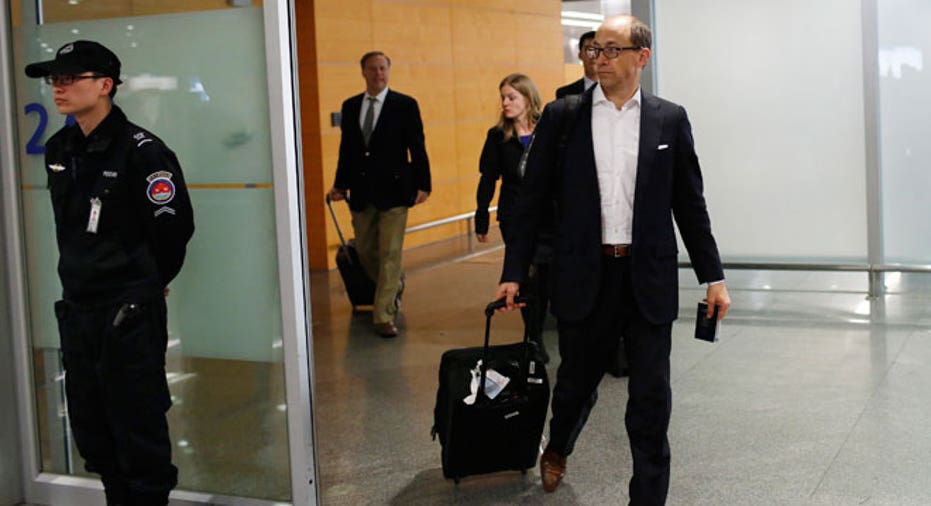Twitter CEO Makes First China Visit

Twitter Inc (NYSE:TWTR) CEO Dick Costolo will meet Shanghai government officials, academics and students in his first visit to China, signaling Twitter's interest in cracking a lucrative but thorny market with 600 million Internet users.
Twitter, which has been blocked by Chinese censors since 2009, described the trip as a personal tour for Costolo, who is due to land at Shanghai's Pudong International Airport on Monday and plans to spend three days in the business capital. He is not scheduled to visit Beijing.
Costolo is scheduled to meet Shanghai government officials — including representatives of the Shanghai Pilot Free Trade Zone, established in 2013 to test market liberalization measures, such as looser rules governing currency conversion and foreign direct investment. But officials have denied media reports that Internet restrictions and censorship, including the blocking of Twitter, will be loosened there.
Unlike at Facebook Inc, whose CEO Mark Zuckerberg is a frequent visitor to China and has openly spoken of his desire to enter China to fulfill his vision of connecting the world, Twitter's senior management has played down the likelihood of seeking a license to do business there.
But Costolo's trip is bound to stoke speculation about the company's ambitions in the country. Major Internet companies including Google Inc and Yahoo Inc have been hampered by Chinese government intervention. Google pulled out of mainland China in 2010, unwilling to accept what it argued was heavy-handed censorship of the Internet.
Any attempt to enter China with Beijing's approval would be a delicate proposition for Twitter, which takes pride in its reputation for defending free speech and rebuffing government requests for private user data.
In a statement to Reuters, Twitter declined to disclose what Costolo intended to bring up with Chinese officials.
"Dick is visiting China because he wants to learn more about Chinese culture and the country's thriving technology sector," a Twitter spokesman said.
Costolo is not expected to ask Chinese authorities to lift the Twitter ban. Twitter has flatly rejected the possibility of opening an office anytime soon in China, which would subject the company to Chinese law.
The CEO, who has never set foot in the country, will also meet university administrators and participate in a round-table discussion with students at Fudan University in Shanghai, the official sponsor of his visa.
CIRCUMVENTING CENSORSHIP
Costolo's visit comes at a time when the Chinese government, two years into President Xi Jinping's administration, persists in a campaign to clamp down on bloggers and dissident voices on social media platforms like Sina Corp's Weibo, which closely resembles Twitter.
In June, Costolo told the American Society of News Editors convention that he would "love to be able to run Twitter as Twitter in China," but added that "we are not going to sacrifice the principles of the platform and the way we think users should be able to communicate in order to do so."
Even if it does not establish an official presence in China, Twitter has avenues to make money from China. For instance, Twitter's subsidiary MoPub, which serves up ads inside mobile apps, counts many small Chinese app developers among its customers, while Beijing-based PC-maker Lenovo Group Ltd is an advertiser on Twitter itself.
Despite the official ban, Twitter, which has 250 million monthly users around the world, has maintained an active, if relatively small user base inside China. While some estimates have placed the number of Chinese users in the tens of millions, just 0.05 percent of all tweets in 2013 were written in Chinese, according to Colorado-based social data provider Gnip, which analyzes Twitter output.
Many savvy Chinese netizens and even state-run media organizations regularly use virtual private networking (VPN) technology to circumvent censorship.
Dissident artist Ai Weiwei, to name one, has tweeted more than 105,000 times and boasts more than 238,000 followers. The state-run Xinhua news agency, official broadcaster China Central Television, and Hu Xijin, the influential editor of the pro-government Global Times newspaper, all maintain active Twitter accounts.



















